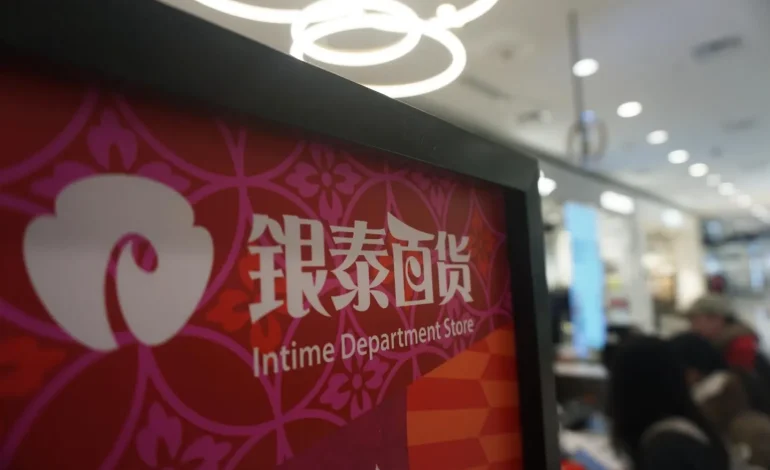Chinese Tech Giant Shifts Strategy Amid Growing Competition and Economic Slowdown.
Alibaba Group Holding Ltd. has announced the sale of its Intime department store business to Youngor Group, a Chinese fashion conglomerate, for 7.4 billion yuan (approximately $1 billion). The move, aimed at offloading non-core assets, will result in a loss of 9.3 billion yuan ($1.3 billion) for the e-commerce giant. This decision is part of a broader strategy under CEO Eddie Wu to refocus on Alibaba’s core e-commerce operations amid intensifying competition from rising domestic rivals like PDD Holdings’ Pinduoduo and ByteDance’s Douyin.
The deal, confirmed in a filing with the Hong Kong Stock Exchange, sees Youngor Group acquiring Alibaba’s 99% stake in Intime, with the remaining 1% belonging to an undisclosed minority shareholder. This latest sale marks a significant step in Alibaba’s effort to divest from offline retail ventures and double down on its core internet-based business.
Alibaba’s initial investment in Intime was part of its ambitious “new retail” strategy, championed by former CEO Daniel Zhang. The goal was to merge online and offline commerce into a seamless experience, with physical stores serving as extensions of Alibaba’s e-commerce platforms. Intime, alongside other investments in hypermarket chain RT-Mart and partnerships with Sun Art Retail and Suning.com, was supposed to be a testing ground for this vision.
In 2017, Alibaba and Yintai Group founder Shen Guojun took Intime private in a $2.6 billion deal. The department store chain was seen as a key part of Alibaba’s vision to modernize traditional retail using AI-driven customer analysis and personalized shopping experiences. Alibaba aimed to generate revenue by charging fees for its customer insights and taking a cut of the sales generated by partner stores.
However, the results fell short of expectations. The business model proved costly and difficult to scale. The shift to online shopping accelerated during the COVID-19 pandemic, further reducing the appeal of physical stores. While the concept of “new retail” garnered attention, Alibaba’s financial returns from the venture were less than anticipated.
Under Eddie Wu, who succeeded Daniel Zhang as CEO, Alibaba is shedding its offline retail ambitions and returning to its roots as a pure e-commerce and internet company. Wu’s leadership strategy centers on simplifying the company’s operations and focusing on higher-growth, higher-margin areas like cloud computing, artificial intelligence (AI), and cross-border e-commerce.
The sale of Intime follows Alibaba’s broader push to divest from non-core businesses. Analyst Wang Xiaoyan from research firm 86Research noted that “Alibaba may continue to sell more assets,” suggesting that the company could offload other investments like its controlling stake in hypermarket chain RT-Mart, which it acquired for $3.6 billion in 2020. Alibaba’s grocery venture, Freshippo (also known as Hema), is another candidate for divestment as the company narrows its focus on digital-first initiatives.
Alibaba’s strategic pivot comes as it faces mounting competition from rivals like PDD Holdings’ Pinduoduo, which has gained traction in China by offering steep discounts on everyday goods. ByteDance, best known for its short-video platform TikTok (called Douyin in China), has also entered the e-commerce space, leveraging its massive user base and sophisticated AI-driven recommendation engine to drive sales.
On top of competitive pressures, China’s broader economic environment is posing challenges for Alibaba. Recent data revealed that China’s retail sales growth in November was the slowest in three months, underscoring sluggish domestic demand. Policymakers have prioritized boosting consumption in 2024 as part of the country’s broader economic blueprint.
In this climate, Alibaba is seeking to play to its strengths. The company’s domestic and international e-commerce divisions, led by Jiang Fan, have been consolidated as part of its restructuring. The goal is to strengthen the company’s competitiveness in its core markets while reducing reliance on offline retail experiments that require heavy investments and long-term payoffs.
Despite the divestment, Alibaba remains a financial powerhouse. In the third quarter of 2023, the company reported a 5% year-on-year increase in revenue to $33.7 billion. Net income surged by 63% year-on-year to $6.3 billion, driven primarily by changes in the valuation of its equity investments.
While Alibaba will record a paper loss of 9.3 billion yuan ($1.3 billion) from the sale of Intime, the company’s underlying profitability remains strong. Its dual-listed shares have risen 15.1% in New York and 11.5% in Hong Kong so far this year, reflecting investor confidence in its new strategic direction.
According to Wang Xiaoyan, the restructuring efforts, combined with an expected boost from China’s economic stimulus policies, may help Alibaba regain growth momentum in 2024. The company’s cloud computing arm, once one of its fastest-growing divisions, is expected to return to double-digit growth next year.
The sale of Intime is unlikely to be Alibaba’s last divestment. Analysts believe that the company will continue selling non-essential assets as it sharpens its focus on its core strengths in e-commerce, cloud computing, and AI-driven retail.
Alibaba’s decision to pull back from its “new retail” experiment underscores a shift in the company’s vision under Eddie Wu. Rather than attempting to reinvent brick-and-mortar retail, the company appears committed to strengthening its digital-first approach.
This could mean a renewed emphasis on AI tools to help merchants optimize sales on Alibaba’s Taobao and Tmall platforms. It also opens the door for a more prominent role for its cloud computing business, which could become one of the company’s most important growth engines.
With China’s economy on a slow rebound, Alibaba will aim to capitalize on rising domestic demand. At the same time, it will continue to compete in the global market, where cross-border e-commerce is emerging as a lucrative opportunity. The company has already signaled its intention to make its logistics network more efficient to support international growth.
Alibaba’s decision to sell its Intime department store chain for $1 billion marks the end of its ambitious “new retail” experiment. Under new leadership, the company is focusing on its core e-commerce operations, trimming non-essential assets, and prioritizing growth in areas like AI, cloud computing, and cross-border commerce.
While the sale will result in a $1.3 billion loss, it is seen as a necessary step toward a leaner, more focused Alibaba. With intense competition from Pinduoduo, ByteDance, and other rivals, the company is betting that a return to its roots as an internet-first business will drive long-term success.
With input from Bloomberg, Forbes, and the Wall Street Journal.









